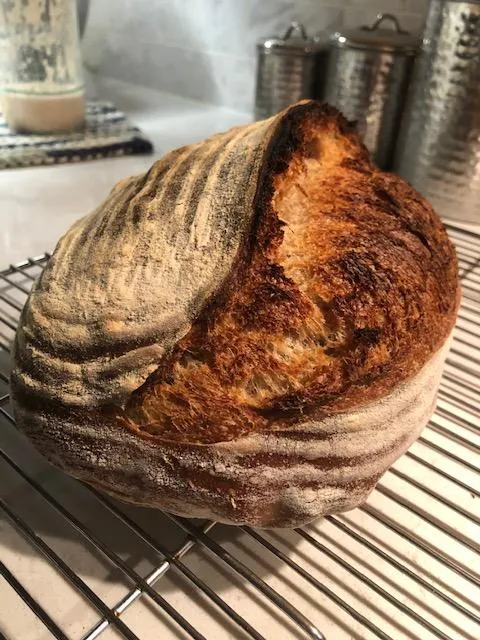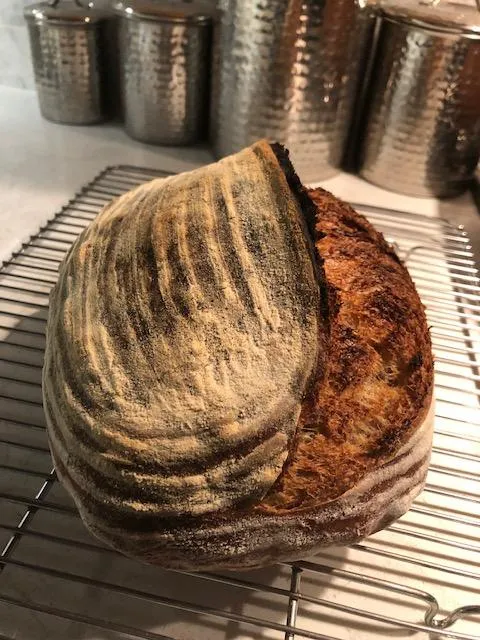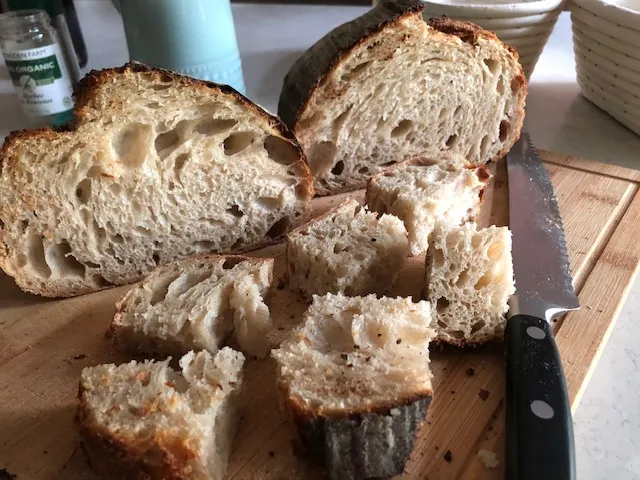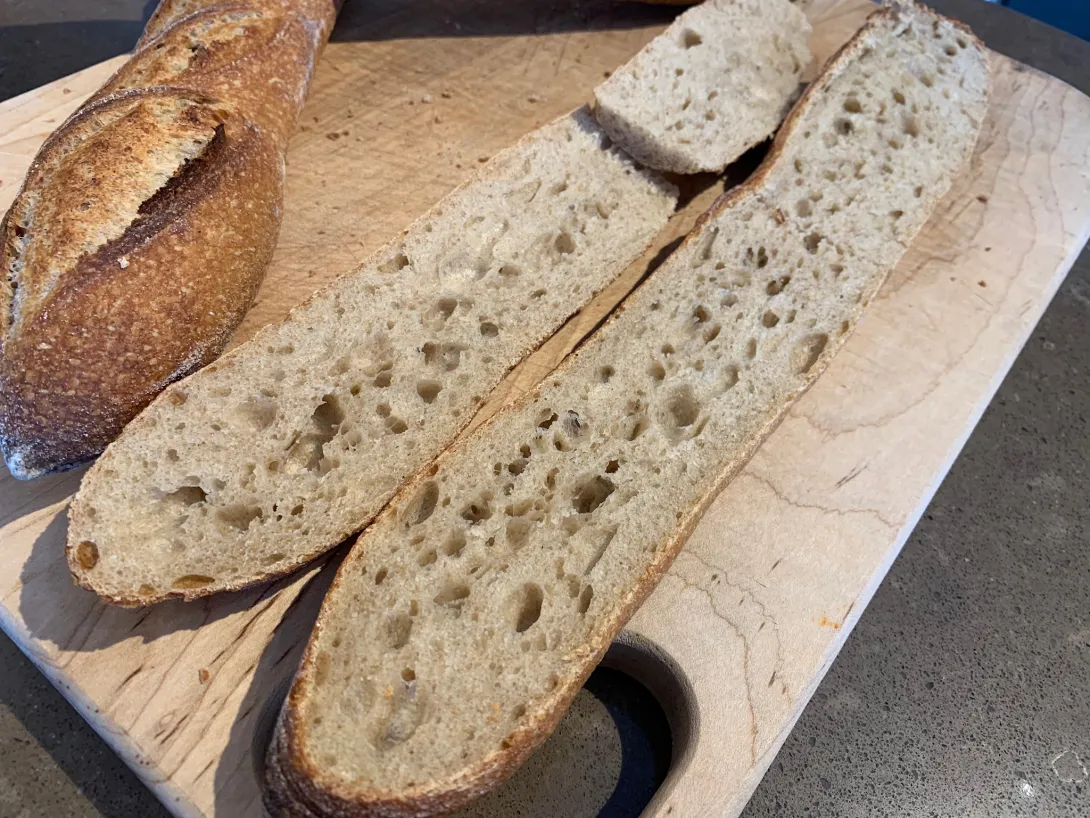I'm continuing this convo as a new general forum topic to see what other thoughts, advice and/or opinions are out there (since I just noticed the original post was generated back in 2016). That link can be found here: http://www.thefreshloaf.com/node/44598/can-i-bake-bread-mixture-sourdough-starter-and-commercial-bakers-yeast#comment-461100
I recently decided to experiment with adding a pinch of organic yeast to my everyday sourdough recipe, with very positive results. I've baked two identical loaves, over the last two days, with the same results. I was looking for a method that would help improve the crumb for a recipe that uses a good portion of bolted whole wheat flour (Golden Buffalo from Heartland Mills).
There is absolutely no ammonia taste as one of the other posts stated. The flavor of the bread was not altered in any way and is just as delicious as always. The crumb was very nice...definitely a little lighter and springier than my usual loaves that have higher concentrations of whole wheat. Shaping is interesting in that the dough has a bit more spring to it. The bulk fermentation was similar but I did notice more rise after the final proof, even with a cold retard of about 4 hours. Oven spring was very nice.
If you do a search on this subject, you can find some pretty intense opinions, which I find interesting. Some people suggest this is 'cheating' somehow if you are making a sourdough loaf. I, for one, will continue to experiment with a pinch of yeast in future bakes, guilt free.



"A small portion of baker's yeast-up to .2 percent can be added to a levain dough without any noticeable changes in the bread's sourdough characteristics. This small amount of yeast will have a slight impact on fermentation and loaf volume. On the other hand, some of the formulas contain yeast in the 1 to 1.25 percent range. When using this amount of yeast, bulk fermentation time can be substantially reduced, a factor that might benefit the baker's production schedule. Bread made with this amount of baker's yeast will, of course, be less acidic than the same dough made with no added yeast. Flavor characteristics can be adjusted by reducing the amount of yeast used, but remember to increase the length of bulk fermentation as the proportion of fresh yeast is reduced, and also to expect a longer final proofing before the bake."
Bread p. 151 Edition 2.
I have never used commercial yeast with sourdough, but I'm not averse to the idea.
Because of my levain behaving so poorly in the current sourdough baguette CB, I have added 0.1% IDY to my dough. This is the first time I have ever done this. The dough fermented slightly faster than I would otherwise have expected. I have the baguettes in cold retard and will bake later this morning.
I've been reading your posts about the starter issue. Hopefully, it's the water as you can correct that with bottled.
Cheers.
Gavin
Thanks Gavin, I hope its the water as well, but Bread1965 is also in Toronto and should be on the same water system and says he isn’t having the same problem, so it may be my starter? I guess we’ll see.
Benny
Hi Benito! How did the baguettes turn out? Did you find any other differences besides a quicker ferment? I hope you will post back with some photos and thoughts on this method!
Hi Leigh, I didn’t want to highjack your thread, but the long and the short of it is that I think that my starter has lost some of its old potency, so I will keep it out on the counter and do a bunch of feeds for the next while with rye.
In the meantime to answer your question, the tiny bit of IDY added to my dough really helped fermentation since my levain was weak. I’d say that the 0.1% IDY addition made the dough ferment as expected for the recipe based on the temperature of fermentation and time. The resultant baguette had great sourdough flavour, I guess I shouldn’t be surprised since so much levain was used. The crust was thin and crisp.
Image

Hi Benito! Absolutely no worries or concerns about any 'hijacking' on my end...thanks for posting the additional information! I hope your starter issues get resolved soon. Those baguettes look lovely and have a great crumb...I'd be happy to be able to be able to produce anything close to that. I haven't really wandered into that realm yet, beyond an interesting 'twisted' version (basically Lazy Person Baguette). I'm glad to hear the yeast helped cover for any starter issues you were having. I've got two more dough batches fermenting right now--an everyday loaf and some focaccia, both with a pinch of organic yeast. I decided to try it in my go-to focaccia recipe as I forgot to feed my AP starter last night, so I'm hoping the yeast will step up to the plate to make up for any shortcomings in that regard. Tomorrow evening I'll start a seeded loaf recipe that utilizes both sourdough and some yeast...the adventure continues ;-)
Don’t let that bulk fermentation get away from you, I’m sure you already know this, but I had forgotten how fast IDY ferments so you really have to watch the dough during BF. Even just that 0.1% makes a big difference.
Keep us posted as to how your bakes turn out, I’m sure they’ll be great.
Benny
Good reminder there, Benny! Especially now with the warmer temps here in the Midwest. I haven't seen a huge increase in bulk ferment yet, but that might be because I am literally only using a pinch or two of yeast--I can't even get it to register on my scale and I have a decent scale. So, I'm not really sure what percent I am using yet. Your post got me thinking though-- I probably need to start weighing some out in a small glass dish, until I hit a gram, then visually portion that out into pinches to get a better idea of actual percent/quantity. But there is definitely an increase in bulk ferment activity, more towards the end of course, so I won't be free from the kitchen for any length of time until the cold proof. Hopefully I'll have something nice to post when it is all said and done. Keep us posted on your starter adventures as well!
I used to have such a hard time measuring yeast and salt that I finally bought a scale that can measure accurately to 0.01 grams. American Weigh Scales American Weigh AC Pro 200 Digital Pocket Scale, 200 by 0.01gm
Hey, thanks, Gavin for posting this. I think I'm one of the few people on the planet who has been baking a while and doesn't have any Hamelman books (heresy, I know ;-)), so I appreciate the information. I agree that the pinch or two of yeast shouldn't affect the flavor profile of the final bake, which is nice. The only change in fermentation and/or proof that I noticed was every so slightly more activity during bulk fermentation, springier dough during shaping and more noticeable 'oomph' during the final proof (which I guess is to be expected). It appears, after doing a little more online reading, the small addition of yeast is more prevalent in a European style of sourdough, at least in some instances. I was just curious why more bakers here in the US seem less inclined to use it since there seems to be some benefit (at least in my very limited experience) in both crumb and oven spring. It could be that most people that are baking with a natural yeast levain want to avoid the chemical nature of commercial yeast, but organic yeast is becoming more widely available and that is what I am using. I have kept a stock of Bioreal in the fridge for several years now but have some Red Star organic ordered and on its way here, so I'll continue to experiment and see how things go. Thanks again for taking the time to post...much appreciated!